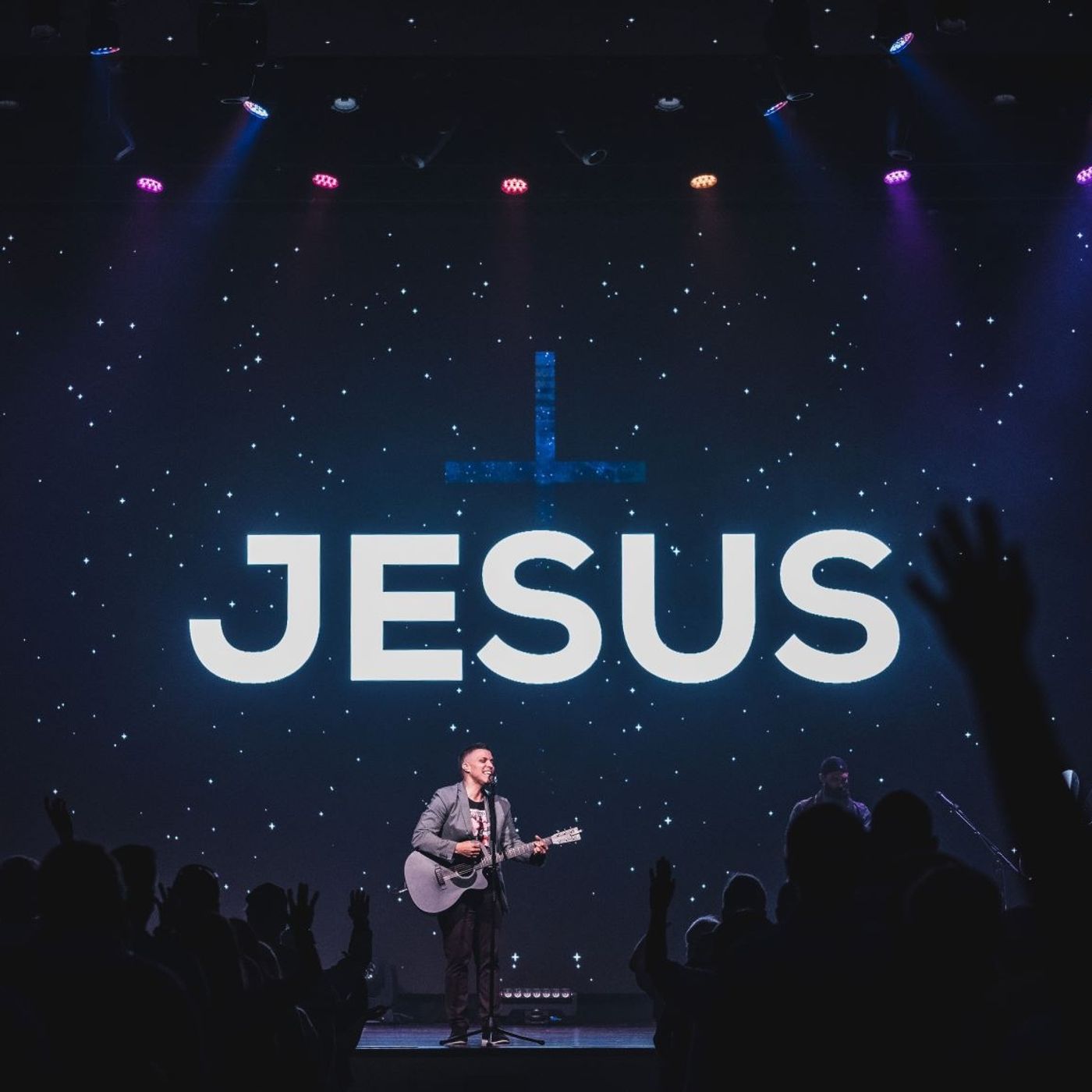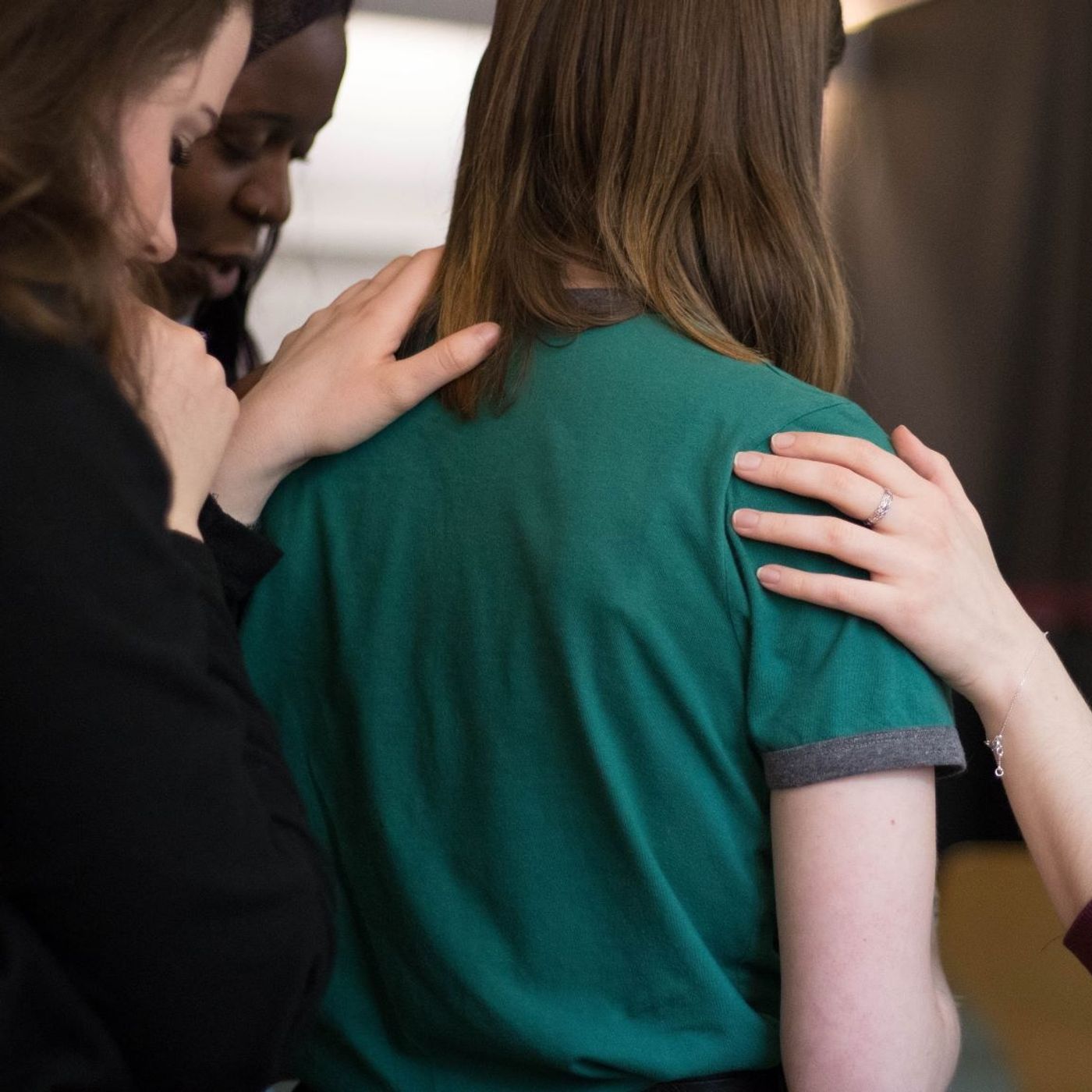Discover Faith Church Sermons
Faith Church Sermons

117 Episodes
Reverse
Have you ever been in a conversation with someone and thought to yourself, “Woah…they have some strange ideas!”??? Do you confront them? Do you ask for more details? Do you just let it go? Maybe it’s not worth the trouble. Or maybe, we need to be more like children. Children? Yes.Think about the classic situation where one child is telling another child about how excited they are for Christmas, because Santa Claus is coming soon, and he will bring loads of gifts for them! The child listening quickly responds, “Wait…you know that Santa Claus isn’t real, don’t you?” Both kids’ parents overhear this, and rush in to the rescue. The first child starts saying, “What do you mean Santa isn’t real? Of course he is real! He brings me presents every year!” That child’s parents start comforting the child, assuring them that the other child doesn’t know they’re talking about. Then the other child’s parents pull them aside with a stern look on their face, saying, “Stop this conversation right now. Just let it go. His parents will decide when they want to tell him the truth.” Children are quick to confront false belief, aren’t they?My guess is that you’ve encountered that Santa Claus situation many times. Perhaps it makes your heart ache, as you long for the first child to continue to enjoy the mysterious wonder of Christmas. Perhaps you agree with the second child, that a false belief needs to be revealed as false!Which is it? Is it okay for a child to be led to believe in something false? I suspect most people would say, “Yes, it’s fine.” Whether it is the Tooth Fairy, Easter Bunny or Santa, they aren’t doing any children harm. But if those beliefs would persist into adulthood, I think just about everyone would have serious concerns. Most of us would say they would be justified in those concerns. Truth is foundationally important. Especially as we consider this from a Christian viewpoint, we should be people committed to the truth. False ideas about life can deceive, leading people astray.As we continue our study in Ezekiel, this coming Sunday we look at what God has to say in Ezekiel 13 about false and true beliefs. I’m not concerned about anyone believing in Santa Claus, but I am concerned that many adult evangelical Christians believe in other false ideas. I’m concerned that those other ideas can lead us astray. In fact, if we are believing false ideas about God, it can result in us not knowing who God is. That is quite serious. A. W. Tozer once wrote that what comes to mind when you think about God is the most important thing about you. He’s right. We need to think about God as correctly as possible, if we want to know God as he truly is. In this sermon, God, through Ezekiel will help us think about who he truly is.
Did you watch the scenes from Afghanistan this past week? Awful, right? People hanging on US Air Force jets as the jets took flight, and the people fell to the ground. How about the destruction in Haiti because of the earthquake? More than 2000 dead. How is it that Haiti has one horrible disaster after another? Then there are the devastating wildfires in the Western USA and Siberia. Do you ever watch the news and think that the end of world must be near?Maybe an asteroid will hit the earth. A big one made the news recently, passing by on July 25th. The scientists at NASA’s Jet Propulsion Lab watch asteroids, and they log them on their website. Look it up, it’s called Asteroid Watch. There are big ones flying by every day. A 2,000 footer passes by tomorrow. While these huge asteroids are classified as near-earth objects, their trajectory only puts them a million miles from us at the closest. The 2,000 footer tomorrow, for example, will pass by 2,130,000 miles away, which is nearly ten times farther away than the moon. So maybe global warming will get us first.Is all this stuff just hype? Have you ever thought that it’s just hype? Or have you wondered if the end is near? People talk like that. They say the end is near. But people have claimed we’re in the end times for decades. Year after year goes by, and the world doesn’t end.Ezekiel once said the end is near. Remember that in Ezekiel chapter 7? It was a big bold prediction of disaster. But nothing happened. Was Ezekiel’s prophecy false? When a prophet’s words don’t come true, they are considered to be false prophets.This week we continue our study in Ezekiel, having arrived at chapter 12, and there we’ll meet people who thought Ezekiel’s prophesy was hogwash. The way God describes those people is really interesting, and he gives Ezekiel another strange skit to try to reach them. What we will learn has very important implications for us in 2021.
This coming Sunday is our next once per quarter Current Events sermon. On the Monday before each Current Events sermon, I scour the headlines looking for sermon ideas. There are so many possibilities. Over the last 18 months, quite frankly, our national headlines haven’t changed a whole lot. That caused me to think about local headlines. I really hoped to find a hot topic that was making a splash right here in Lancaster County.Initially I thought of Eagle Disposal and their struggle with labor shortage. I am an Eagle customer, and in the last few months, they have missed a regular weekly garbage and recycling collection three different weeks. All up and down our street, people would set out our collection bins, and they would remain on the edge of our yards for days, till one by one we realized that Eagle wasn’t picking up that week. Why would they not at least communicate with us? This past week Eagle sent a letter saying they were discontinuing recycling collection. Things are not well at Eagle. Why can’t they hire people? What might the Scriptures have to say about labor shortage or garbage collection? A lot, actually, and I would be glad to talk with you about that. But in the end, I decided not to talk about Eagle.Instead, I asked three local Christians what they thought I should preach about. They each attend other churches, and they each have a unique vantage point in our community. Matt Hess is an East Lampeter Township Detective. Sally Bredeman is principal of Smoketown Elementary. Anne Shannon is a WGAL reporter. All live in Conestoga Valley, and all have kids who attend the school district. Additionally, their jobs put them in communication with a wide cross-section of the community. Finally, I asked my barber, Shane, who works at Main Street Barber Shop in Leola. He might have the most interesting conversations of all. They responded with a variety of ideas that I could preach about, many of which you would find quite familiar: personal responsibility, sexual identity/ethics, Covid, etc. I thought their responses could lead to an interesting panel discussion or sermon series. But as I reflected on their suggestions, I had the sense that we need to see the forest for the trees. They gave me excellent ideas, each of which we could say was an individual tree, a singular issue in society. It struck me that we all likely already have opinions about those issues. It would be helpful to examine what Scripture would have to say about those issues, and sometime perhaps we will, but I thought it would be good to zoom out, trying to see the forest for the trees. What I mean is this: what are the societal or cultural forces that influence how we have already formed our opinions about those issues? We first need to examine those forces, those influences, before we evaluate the issues. And that led me to our sermon topic for this coming Sunday’s Current Events sermon. See if you can figure it out…it’s a bit of riddle. Here it is:Why We Are A Purple ChurchHave any ideas what it is about? Grab a Bible and play the sermon to see what Scripture has to say about why we are a purple church.
Is there hope for a world on fire? Do you feel like it is hopeless? Lately watching the Delta variant on the rise, it can feel hopeless. Do you know what I mean? Are you wondering if we’re going to have to start wearing masks again? Have you had disagreements or differences of opinion among family and friends about the vaccine? It can feel so frustrating, right?Or what about politics? Do you feel like it hopeless? Watching politicians disagree about seemingly everything, and rarely trying to reach across the aisle to work together, can be so disheartening. Each side seems to have gravitated to the extreme ends of their belief system, and they caricature the other side as evil. Have you had disagreements or differences of opinions among family and friends about politics? Or what about sexual ethics? Do you feel like it is hopeless? The school board meetings, the proposals in government for fairness in sports, and the actual human people affected…it’s all so fraught. Maybe you’ve had discussions and disagreements about that too.Then there is Critical Race Theory. What is true? What is false? It can feel hopeless. Last week we left Ezekiel in a bit of a cliffhanger. God had transported Ezekiel through a wild virtual reality vision back to his hometown, Jerusalem, where God gave Ezekiel an unsettling tour through the temple. Room after room in the temple, God showed Ezekiel how the Jews living there were worshiping idols and practicing pagan religion. Then God says he has had enough of the Jews’ adultery, and he not only begins leaving the temple, but he also unleashes judgment on the city. While the judgment is awful, God first saves those who remained faithful. Remember that all of this took place in a vision, meaning that it was a prophecy of what was to come upon the people there in Jerusalem. That is where we stopped, with Ezekiel still in the middle of the vision, a vision that mostly seems hopeless.There is more to come, including an important message from God that will become a major theme throughout the rest of the book of Ezekiel. Let me give you a hint: it’s not hopeless! But why? Check out Ezekiel chapter 11 ahead of time, then listen to the sermon as David Hundert preaches this chapter.
I would like to introduce you to what I consider to be one of the strangest (and maybe most interesting!) verses in the Bible. Ezekiel 8:3,“He [the glowing metal fire creature] stretched out what looked like a hand and took me by the hair of my head. The Spirit lifted me up between earth and heaven and in visions of God he took me to Jerusalem, to the entrance to the north gate of the inner court, where the idol that provokes to jealousy stood.”Did you get all that? Do you need to read it again? Yes, that is a real Bible verse! We’ve been studying the amazing book of Ezekiel for a few months now, and lest there be any doubt of its uniqueness, I think what happens next will seal the deal. So far Ezekiel has experienced some very shocking visions, and God has asked him to perform unsettling prophetic dramas, living among his fellow 10,000 Jews in exile in Babylon. In chapters 1-7, therefore, we learned that Ezekiel’s ministry is unconventional. It is true that last week in our study of chapter 7, we heard Ezekiel preach a fairly standard prophetic word. Get ready, though, because what happens next is anything but. Just read that verse again up there. What do you think it means? Check out Ezekiel chapters 8, 9 and 10 to see for yourself, then watch the sermon. I think you’ll find that what happens next in Ezekiel’s life is very applicable to us. I know…whatever is going on in Ezekiel 8:3 seems like the last thing that might relate to life in America in 2021. But there’s a lot more to the story. More than you and I need to consider, as we seek to be faithful disciples of Jesus in our world.
The end is near!!!Encouraging start to this description, huh? But have you wondered if the end actually is near? Have you looked at our world situation, our national situation and wondered if Jesus is coming soon? If you have, you’re not alone. I’ve heard people speculate about it a lot lately, especially given the tumult in our world and nation in the last few years. Musings about the end times have been a part of Christian discussion, and especially evangelical belief, for a long time. Remember how popular the Left Behind series was? The Left Behind series was an attempt to dramatize what it would be like if the end times happened in our world. The first novel was published on December 31, 1995. 15 novels later, the series concluded in 2007. It also spawned a load of kids’ books and three movies. The end times were a fascination, however, long before the Left Behind series began. Larry Norman’s popular song about the rapture, “I Wish We’d All Been Ready” came out amid the turmoil of 1969. Keep traveling backward in history. Imagine how Christians living through the World Wars must have felt about the end times. They had a far better case for believing that they were living in the end times than just about any other time in history. Now travel back further in time to the 1860s, and our American Civil War was another awful period that sure looked like end times. Globally, speaking there are plenty of other examples. Genocides, Holocausts, terrible disasters, war, and displacement. All seem like end times.The original proclamation of “The end is near!” goes back way further still. Millenia further! 600 years before the time of Jesus, Ezekiel boldly declares not that “The end is near,” but that “The end has come!” While he may have heard the prophet Amos say this years earlier (see Amos 8:2), Ezekiel is simply declaring what God told him to say about the times he lived in. So what end had come during Ezekiel's lifetime? More importantly, why was God saying that had the end come? Though the end has not come for us, meaning that Jesus has not returned, we can learn much from the end times that had come upon the Israelites in Ezekiel’s day. God has important principles to share with us through the message he gives to the prophet Ezekiel. As I studied the passage this week, it struck me how relevant it is to our current situation of American Christianity in 2021. Check out Ezekiel chapter 7 ahead of time to see for yourself, then listen to the podcast!
Earlier this year in one of the Current Events sermons, I talked about Ravi Zacharias and his moral failure, which came to light over the last few years. (You can read the sermon blog posts starting at joelkime.com.) He was deeply abusive to many women, and there was a leadership culture in his organization that did not adequately hold Zacharias accountable. He passed away before the investigation revealed the extent of his abuse. I was stunned and deeply saddened by the news of Zacharias’ abuse. He was such a gifted thinker, writer and preacher who God used to strengthen the faith of many, including me. Maybe you’ve experienced a shock like that, when a Christian you respect and hold in high esteem fails. It hurts, doesn't it?Certainly, the moral failure of anyone is serious, and we should be concerned about it. But there are times when a Christian leader fails and it rocks our worlds emotionally and sometimes spiritually, to the point where we can have a deep ongoing struggle. Have you experienced anything like that? I suspect that our appreciation for Christian celebrities is mostly good and helpful. We enjoy their music because it points us to a deeper relationship with Jesus. We read their books because they help us know God better and live more in line with his Kingdom. We listen to their TV shows and podcasts because they inform us about God’s word. At the same time, are we evaluating if our appreciation for such Christian celebrities has crossed a line into idol worship? I wonder that about my admiration of Ravi Zacharias and other so-called Christian celebrities. What I also wonder is whether our celebrity culture has so impacted evangelicalism that it can lead to idol worship during our worship services. I think it is possible. And we’ll talk about that on Sunday. Last week in our ongoing study of the prophet Ezekiel, we talked about American Christian idols, and this week we’ll talk about how idolatry might be happening inside the church, even in our worship services. Yes, even in Faith Church’s worship service. As you can imagine, it concerns me greatly. Check out Ezekiel chapter 6 ahead of time to see for yourself, then listen to the podcast.
Do you worship idols?Of course not, right?Or do you?When I was in seminary for my Master’s degree I took a course called “American Idols.” It wasn’t about the famous singing competition! Instead it was about the various ideas or objects that we Americans idolize. There are a number of really good possibilities for the category of “American Idol.” What possible idols do you think we studied in that class? Take a moment and make a list. What tempts you? Is there anything that usurps the role or focus that God should have in your life?As you think about that list, let me repeat the question I started with, “Do you worship idols?”I can’t answer that question for you personally. But I feel pretty confident in saying that American Christians are often tempted and actually succumb to idol worship. I’m not talking about statues made of metal or wood. I’m talking about other American idols, and it wouldn’t surprise me if we, the people of the family of Faith Church, are also tempted to and actually do worship idols. I say this because I know myself, and I know the pressures we American Christians face in our society. Idol worship is alive and well, even among Christians. Idol worship can infect a church, including church worship services.This coming Sunday we continue our study of the prophet Ezekiel, and we will learn that Israel was worshipping idols. They were practicing idolatry, and God will ask Ezekiel to call it out. That means we’ll need to talk about what idolatry was like for Israel in that day and age, as well as what it might be like in our day. In order to be followers of Jesus who have hearts becoming more and more like his, we will want to avoid idolatry. What we will find in this next section of Ezekiel is that when God asks Ezekiel to call out Israel’s idolatry, he asks Ezekiel to do so in a very bizarre way. Check out Ezekiel chapters 4 & 5 ahead of time to see for yourself, then listen to the podcast.
In my sophomore year of Bible college, my dorm section Resident Assistant (older student in charge of the dorm section, which included about 20 guys) asked me if he and I could become accountability partners. I had heard of such a thing, but didn’t really know much about it. The Resident Assistant, Chris, was a senior, and I looked up to him, so I was interested in what this accountability partnership would mean. He explained that it came up in one of his classes, or maybe in a book he was reading, and he wanted to try it. What it would look like is that we would each write a list of questions that we wanted the other person to ask us weekly. Then when we would meet, we go through the lists and pray together, seeking to encourage one another to be more faithful disciples of Jesus.At the time, I was newly seeking to know Jesus better and follow his ways in my life, so I was 100% on board. We each wrote out questions on paper, trying to focus on areas of life that are important to all disciples, as well as areas that were unique areas of struggle for each of us. The list included questions about how we were doing with having consistent Bible study, prayer, and how we were doing academically. We added questions about how we were handling our finances, our dating relationships, about lust and pornography, and about media like TV. In other words, we were seeking to live a life of purity, flowing with the Fruits of the Spirit? I think each list had 15-20 questions, and we would ask them to each other one by one every week. The listed concluded with the same final question: Did you lie to me about anything? Then we kept the other person’s list in our Bibles as a bookmark reminder to pray for the other each day.That kind of deep, relational accountability has been so meaningful and formative in my life. In fact, Chris and I continue to meet for accountability and prayer to this day, nearly 30 years later. We don’t meet every week, and we don’t have lists anymore. Instead, the Q & A is incorporated in our discussion. Chris shares his joys and struggles with me, and I share mine with him. Then we pray, right there in the car, usually in the parking lot of the restaurant we met at. We also text frequently between face-to-face meetings, which are now about once every other month. As you read that story of Chris and me, how does that sound to you? Do you need that kind of accountability in your life? Do you think maybe you don’t need that? In this sermon, we continue our study of the prophet Ezekiel, and I will attempt to make the case that we all need accountability in our lives. Open a Bible to Ezekiel 3:16-27 and play the sermon.
Do you tell the truth? Of course you do…or do you? Are there times when you might fudge a bit on the truth? I suspect that all of us struggle with lying here and there, but for the most part we are committed to telling the truth. I ask the question, though, because there are times when telling the truth is very tricky. For example, what do you do when a friend or spouse asks, “How do I look?” and you think their outfit doesn’t look so great? Worse, what do you do when a spouse says, “Do you think I’ve gained weight?” You know they have gained weight, but red flags are flying, saying, “LIE! LIE! LIE! Get yourself out of this trap. Tell them they don’t look like they’ve gained even an ounce.” Harder still can be those situations in life when a person in your life is behaving badly, and you know need to talk with them, but you are afraid of alienating them or offending them. Should you speak truth to them? What if you lose them? What if they stop talking to you? It’s complicated, emotional and we can clam up, while the person continues their bad behavior. These are difficult situations, and while we might not tell outright lies in those scenarios, we can avoid the truth. Does that resonate with you? What do we do about it?As we continue studying Ezekiel, the next passage describes God’s commissioning of Ezekiel to that very role, the role of a professional truth-teller. There will be much we can learn from God’s commissioning of Ezekiel that will help us as we consider the oftentimes difficult task of truth-telling. Open a Bible to Ezekiel 2:1-3:15, then listen to the sermon.
In this sermon we study Ezekiel chapter 1, and it is wild. I don’t believe I can exaggerate how fascinating is this chapter of the Bible. Before you view the sermon, open your Bible and read Ezekiel 1 and see for yourselves. Try to figure out what is going on. It might be tempting to think that it is a chapter of the Bible that has absolutely nothing to do with our lives in 2021. Think again. What I found as I studied this convinced me that this bizarre chapter of the Bible is meaningful and practical for us in a very important way. Now I invite you to listen to the sermon!
We are starting a new sermon series on the book of Ezekiel! My normal pattern is to preach through a book in one testament, and then move to a book in the other testament. Since we just finished Colossians in the New Testament, I started thinking and praying about which Old Testament book would be a good fit. I also talk it over with Michelle. She suggested Ezekiel. Immediately I thought, “Ezekiel? Really? I don’t know…” Why was I hesitant?First of all, it is loooooong. Very long. Take a guess at where Ezekiel ranks if you list the books longest to shortest. 4th place! In fact, it is only 229 words shorter than Psalms. Ezekiel has 29,918 words. (Trivia question: What are the two longest books of the Bible? Find the answer in the PS below.) Second, Ezekiel is fairly unfamiliar to me. I looked in my files and I had only preached one sermon on it previously. If I selected Ezekiel, I’d have some learning to do. Who was this guy, Ezekiel, anyway? Third, I feel intimidated by prophecy, and Ezekiel is one of the Old Testament prophets. The 12 short books at the end of the Old Testament are a bit more manageable because they are so small. Ezekiel is a whole different ballgame, as it is a big long prophetic tome. Could I handle it? Furthermore, prophecy can get really odd. How will people receive it? Does it relate to Faith Church in 2021? But, I was intrigued. When I considered all the books of the Bible I have preached since I became pastor 13 years ago, I had to admit that other than a 12-part overview series on the Minor Prophets, I had rarely preached from the prophets. That means preaching through Ezekiel, given its genre and length, would be like nothing I’d preached before. I found that uniqueness appealing. So I opened up the book of Ezekiel to see what I would find.As I mentioned above, if you would have asked me last week to describe Ezekiel, before I started reading, I wouldn’t have been able to tell you much. How about you? Without reading it, what do you know about Ezekiel? I was familiar with his vision of God in chapter 1, with his theme about Israel needing a new heart, with his prophecy about a foreign king that sounds like it might have a double-meaning describing Satan, and finally with his famous vision of the valley of dry bones. That’s it. And that's not much.So one night last week as I started reading Ezekiel, I outlined it to see how it might work as a sermon series. It didn’t take me long to confirm that I did not know much about Ezekiel. I’m sure I must have read it sometime, but if I did, it was long gone from my memory. What I was reading was mostly new to me, and what’s more, it is WILD! I kid you not, Ezekiel is unique, and it is wonderfully weird. But all the way through the bizarro stuff we’re going to discover in the book, Ezekiel’s prophetic message is powerful, and I think very applicable to us. Even though I was reading for a while, I couldn’t put it down. I worked through the whole book that night, and I came away from it excited about this sermon series. In this podcast I’m going to introduce the book, and then the following week we’ll start with chapter 1. Then we'll continue working our way through the book in a series that will finish sometime in 2022. The introduction will set the context and help us understand the scope and themes. My prayer is that our study through Ezekiel will be lifechanging. From what I read and studied so far, if we take heart to Ezekiel's prophecy, I don't think we can help but be changed by the Spirit of God.PS – Answer to the Trivia question: the 2nd longest book of the Bible is Genesis (32,046 words) and the longest is Jeremiah (33,002 words).
We've arrived at the end of Colossians. This week we welcome guest teacher David Hundert who will be teaching us about this P.S., this postscript. Get ready for the writer, the Apostle Paul, to mention all sorts of names. We're going to meet people who were some of the earliest Christians, people who were his ministry associates. More than that, we'll learn how their lives as disciples of Jesus in their day can help us become more faithful disciples of Jesus in our day.
How do you measure the health of a church family? I’m not talking about medical health. I’m talking about our discipleship to Jesus. When it comes to our belief about and practice of discipleship to Jesus, are we healthy? I know Faith Church isn’t perfect. No church is perfect. Because of that we don’t want to assume that we are doing just fine. Instead we should strive to maintain a humble, teachable posture, welcoming evaluation of ourselves. As difficult as it can be to learn that we have a problem, we need to know if we have unhealthy discipleship in our church family. We do not want to shrug off potential issues as if they are no big deal. So again I ask, how do you measure the discipleship health of a church family? Our Vision Team (comprised of our Leadership Team members, Serve Team chairpersons, and our staff) is reading Reggie McNeal’s book Missional Renaissance, in which he argues that churches need to start using a new scorecard. For too long, McNeal says, churches have been focused on the metrics of “bigger is better.” In other words, if a church family is gaining more worship attenders who give more money so they can build ever larger buildings, that church was considered to be healthy. Another metric has been applied to smaller churches, and that is their ability to keep offering worship services week in and week out. If they are continuing to pay their bills and hold worship services, they were considered to be healthy. Whether big or small, worship attendance, buildings and budgets rarely give us an accurate diagnosis of discipleship health. So what measurements do give us a picture of our health as disciples of Jesus? As we continue our sermon series through Colossians, Paul has written quite a bit about what a healthy church looks like. In chapter three he said that a healthy church focuses on things above, by removing the dirty clothes of the sinful nature, and putting on the clean clothes of new life in Christ. This coming Sunday he will teach us two practices that healthy church families make a consistent, intentional part of their lives, as they seek to be disciples of Jesus who put on those new clothes, focusing on things above. Open your Bible to Colossians 4:2-6 and then follow along with the sermon.
Two weeks ago, in our study through Colossians, we learned, “whatever you do, whether in word or deed, do it all in the name of the Lord Jesus, giving thanks to God the Father through him.” (Col. 3:17) Last week we looked at how Paul applied that principle to families. Now this week in Colossians 3:22-4:1, we are going to learn how he applies the principle to work. Students, we’ll also learn how this relates to your academic career. Not a student or a worker? Retirees, the principle will also relate to how you spend your retirement.Check out Colossians 3:22-4:1 ahead of time, then listen to the podcast as we talk about it.
How do you spend your time in an average week?There are 168 hours in a week. Let’s tally up how we use those hours. I’m going to list averages, so you can adjust the numbers a bit to align with your life, as we humans have a lot of variety in our use of time. First of all, sleep. We sleep on average 7 hours per night. Add in naps, and that works out to about 50 hours per week. Second, eating. This one is probably all over the place. 21 meals, plus snacks…let’s go with 10 hours per week. Third, personal hygiene. Think bathroom tasks. Probably another 10 hours per week. Fourth, cleaning and chores, another 10. Fifth, school or work. We work about 8 hours per day, five days per week. Or if you are a student, you are in school about that much. That’s another 40 hours. Where’s our total so far? 120 hours. That leaves 48 hours for commuting, volunteering, church, family time and personal time that could include hobbies, exercise, media, etc. How do you spend that remaining 48 hours? My point in asking us to examine how we use our time each week is that we rarely do this kind of self-evaluation. In other words, are you using your 168 hours the way you want to?More than likely, you are in a routine, and we allow that routine to guide us week after week, month after month, year after year. When is the last time your evaluated your routines? While there may be needed course corrections in how we spend our time, my guess is that most of us have established routines because those routines are useful to us. Routines are not bad. In fact, we can rely on a routine for decades, and it may serve us quite well. Handled rightly, routine can actually be a very good thing. What we heard last week in our study through Colossians is this, “Whatever you do, whether in word or deed, do it all in the name of the Lord Jesus, giving thanks to God the Father through him.” (Col. 3:17) Are your routines in line with "do all in the name of Jesus"? Looking at your 168 hours per week, are you using them in line with "do all in the name of Jesus"?As we continue our study in Colossians, the writer, Paul explains in more detail just how it is that we do all in the name of Jesus, especially looking at those places where we spend most of our time. At home and at work. Or for students, at school. And for retirees, where you volunteer. We're going to look at family this coming week, and then work (or school or volunteering) the next week. Check out Colossians 3:18-21 ahead of time, then listen to the podcast!
I recently read some articles that surveyed people who stopped going to church. Their answers about why they chose to stop going to church revealed a trend. While there is no doubt that Jesus is a “stumbling block,” as his teaching will naturally turn some people away, the vast majority of the people who stop going to church do so because Christians in the church were acting unlike Jesus. Over the years we’ve heard this before, right? One hundred years ago Ghandi, the famous leader of India, said, “I like your Christ. I do not like your Christians. Your Christians are so unlike your Christ.” Take a moment and consider what Jesus must have been like. Even for atheists or believers in other faiths, it is hard to argue against the idea that Jesus was amazing. He was filled with compassion, kindness, humility, gentleness, patience, love, peace, and truth. No wonder crowds numbering in the thousands flocked to hear him. I’m sure the miraculous healings also helped his popularity soar. But there is no doubt that Jesus was compelling. Not just the miracles, and not just the teaching, but how he lived his life was astounding. He was not in a hurry. He cared deeply about all people. He practiced what he preached. He lived a consistent life. He was hilarious, sincere, fun and serious when he needed to be. He was selfless.Now consider what people see when they observe us. Can it be said that we are drawing people to Jesus because our lives look more and more like his? I’m not suggesting that you have to be perfectly like Jesus. I’m getting at what we’ve heard the Apostle Paul writing about in Colossians 3, that we are people who have been raised with Christ to new life, so we seek with our hearts and we ponder with our minds the way of the Jesus, which is sometimes called a Kingdom mindset. Last week in Colossians 3:5-11, we began a two-part miniseries in which Paul describes how to have that Kingdom mindset, using the metaphor of laundry. In that passage, part one was “take off the dirty clothes” of the old sinful nature. This week in part two is “put on the clean clothes” of the new way of Jesus. I invite you to open a Bible to Colossians 3:12-17 and then follow along with the podcast.
How long do you typically wear a pair of jeans before you wash them? Unless I get them sweaty or so dirty they are unpresentable, I will wear a pair of jeans for multiple days because I want to preserve water as well as avoid wear and tear on the denim. But after a couple days, natural skin oils leave my jeans feeling grimy. Also the normal motion of my daily activity stretches them out, and they feel too loose. For me, the sweet spot is three days, but no more than that. After day three, the jeans go in the dirty laundry bin. How about you? Are you a single-use person? Maybe two days? How many days do wear them?Believe it or not, the CEO of Levis, Chip Bergh, said that you should never wash a pair of jeans. He meant it, claiming that he does not ever wash his jeans. Washing them, he said, does damage to the denim. Instead he spots cleans with a toothbrush, as needed. How do you feel about that?I love the feeling of newly-washed jeans, either crisp from being line dried, or softer from the dryer. Admittedly, Mr. Bergh is right; over time, washing jeans will fade their fabric. Mine always thin in the knees, inevitably leading to holes. But I can’t imagine never washing my jeans. Wouldn’t they start to stink? They would! Anti-washers have solutions for that. Put your jeans in the freezer overnight to kill the bacteria creating the odor, or hang them out in the sunlight, or spray them with a deodorizer. Again, I ask, how do you feel about that?I’m talking about laundry because over the next two weeks, in this week sermon in our series through Colossians, the writer of the letter of Colossians, the Apostle Paul, talks about laundry. This week is part 1, taking off the dirty clothes, and next week, part 2, will be about putting clean clothes on. When it comes to the kind of laundry Paul is talking about, it seems he would differ from the CEO of Levis. But what kind of laundry is Paul talking about? Check out Colossians 3:5-11 and then listen to the podcast as we talk about it further!
Have you heard of autostereograms? If you are a child or teen of the 1990s, you are likely quite familiar with autostereograms, but maybe you don’t know them by that name. Let’s see if you recognize them when I give you the name of the most famous commercialized version of autostereograms: Magic Eye pictures. Now do you know what I’m talking about? In the 1990s these 3D computer-generated images were so popular that Magic Eye books were on the New York Times bestseller lists for a combined 73 weeks. I was delighted to learn today that all these years later, they have a website!Magic Eye pictures are actually random dot autostereograms, three-dimensional pictures on two-dimensional surfaces, created by artists using computer-generated imaging. Look at the example here: https://en.wikipedia.org/wiki/Autostereogram It looks like a pattern of colorful dots, but there is actually a 3D image of a shark as well. Can you see it? I promise you...it's there. I made sure of it! I remember looking at these images, agonizing as I failed to find whatever 3D image was supposed to be hidden in plain sight. Maybe you remember the feeling too? It could be exceedingly frustrating. I would cross my eyes. I would stare. I would look up, down and all around. What did I see? Nothing but those colorful dots. There was no 3D image! Was this all just a grand prank? The instructions in the books said you had to look "behind" the image, whatever that meant. I tried and I tried, and then one day, all of a sudden, there it was! A 3D image was, and it seemed magic.When I say, “all of a sudden,” and add that with the word “magic,” it gives the impression that the ability to see the hidden image is not something that we can control. But that is entirely not true. In fact, the trick to seeing the 3D image in these autostereograms is all about focus. Once you learn to focus your eyes “behind” the image, you will see the 3D picture quite easily. When it comes to Magic Eye pictures, there is nothing magical about it. Focus is everything. More specifically, learning to focus the right way is everything.The same can be said for being a disciple of Jesus. Learning to focus on Jesus is everything. Just like Magic Eye pictures, if we want to see Jesus properly, we have to focus on the right thing, in the right way. Also like Magic Eye pictures, learning to have the right kind of focus can be difficult, especially as we live in a world that draws our focus elsewhere. As we resume our series through Colossians, we’re going to be talking about how to focus on Jesus in the middle of our sometimes busy and confusing lives. It is possible to focus on Jesus, and when you learn to do so, what you will see is amazing. In this video we study Colossians 3:1-4 as learn how to focus on God!
This is my 13th year in a row preaching an Easter sermon. To be honest with you, when I considered that, I felt we needed a change. If I rotate through the four Gospel accounts of the resurrection each year, that means I would be starting my fourth rotation. The Gospel accounts of the resurrection aren’t all that different. Sure, they each have their nuances, and those are important. That’s why I rotate through them. But this year, I felt the need for something different. Don’t worry, we’re still going to talk about the resurrection! But we’re going to talk about it differently. In fact, we’re not going to study one of the four Gospel accounts.My concern is that Easter can be the same year after year after year, and we can allow ourselves to tune out. We shouldn’t tune out though. The resurrection of Jesus is so momentous, so important, that we should be able to talk about it every day and not get sick of it. But that kind of excitement about the resurrection doesn’t describe our real world experience, does it? How many of you can’t stop talking every day about the resurrection because you are so excited about it? If you’re like me, while you believe the resurrection of Jesus is the most important event in history, you probably don’t think about it or talk about it much. So this year, rather than review the story of Jesus’ resurrection in the Gospels, for fear of all of us just tuning it out, we’re doing something different, something I hope will renew in us a wonderment for the resurrection. Let me ask you: if you didn’t want to use one of the Gospel accounts of the resurrection, but you still wanted to talk about the resurrection, what would you do? Would there be a passage of scripture you would turn to? Listen in to find out!
























